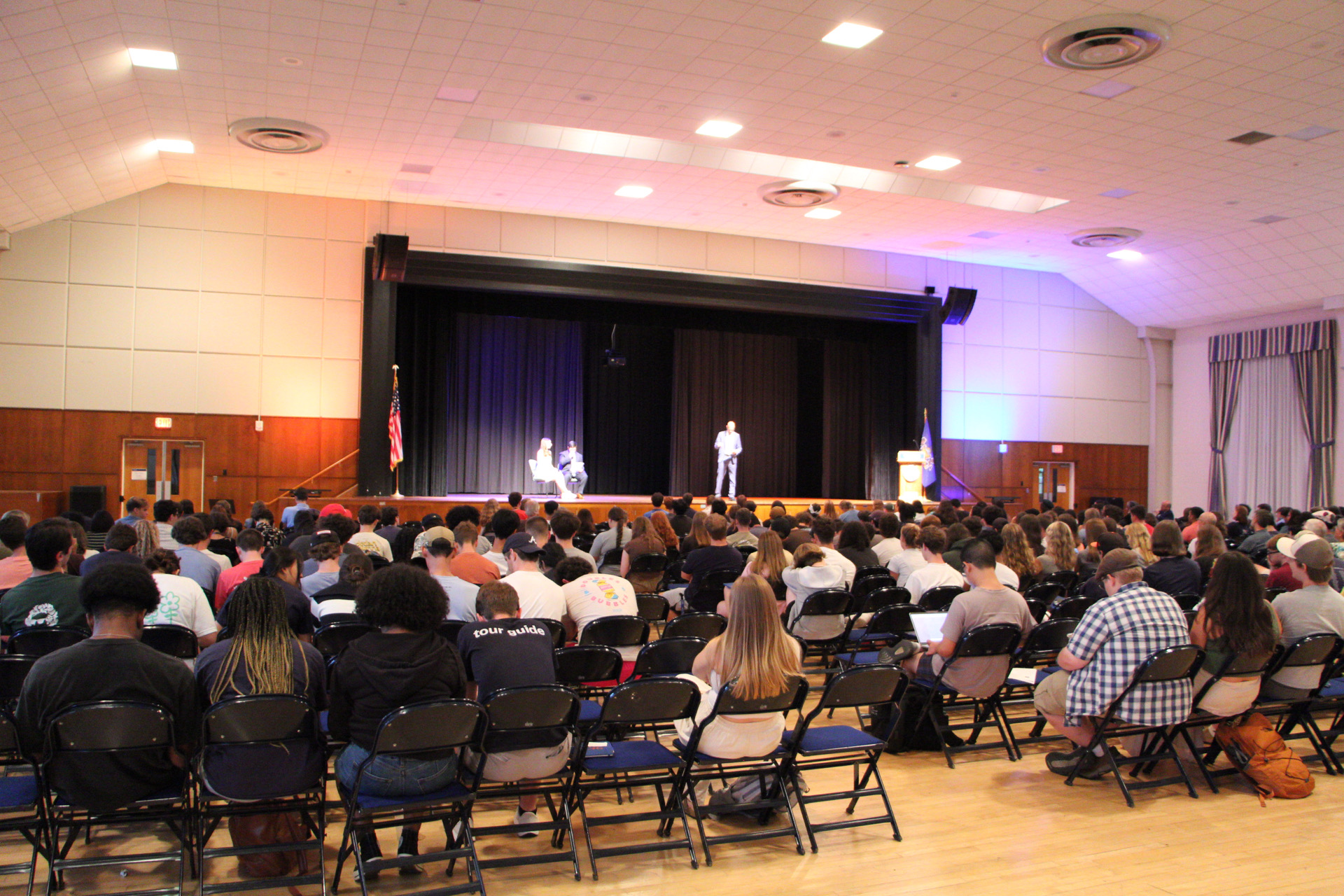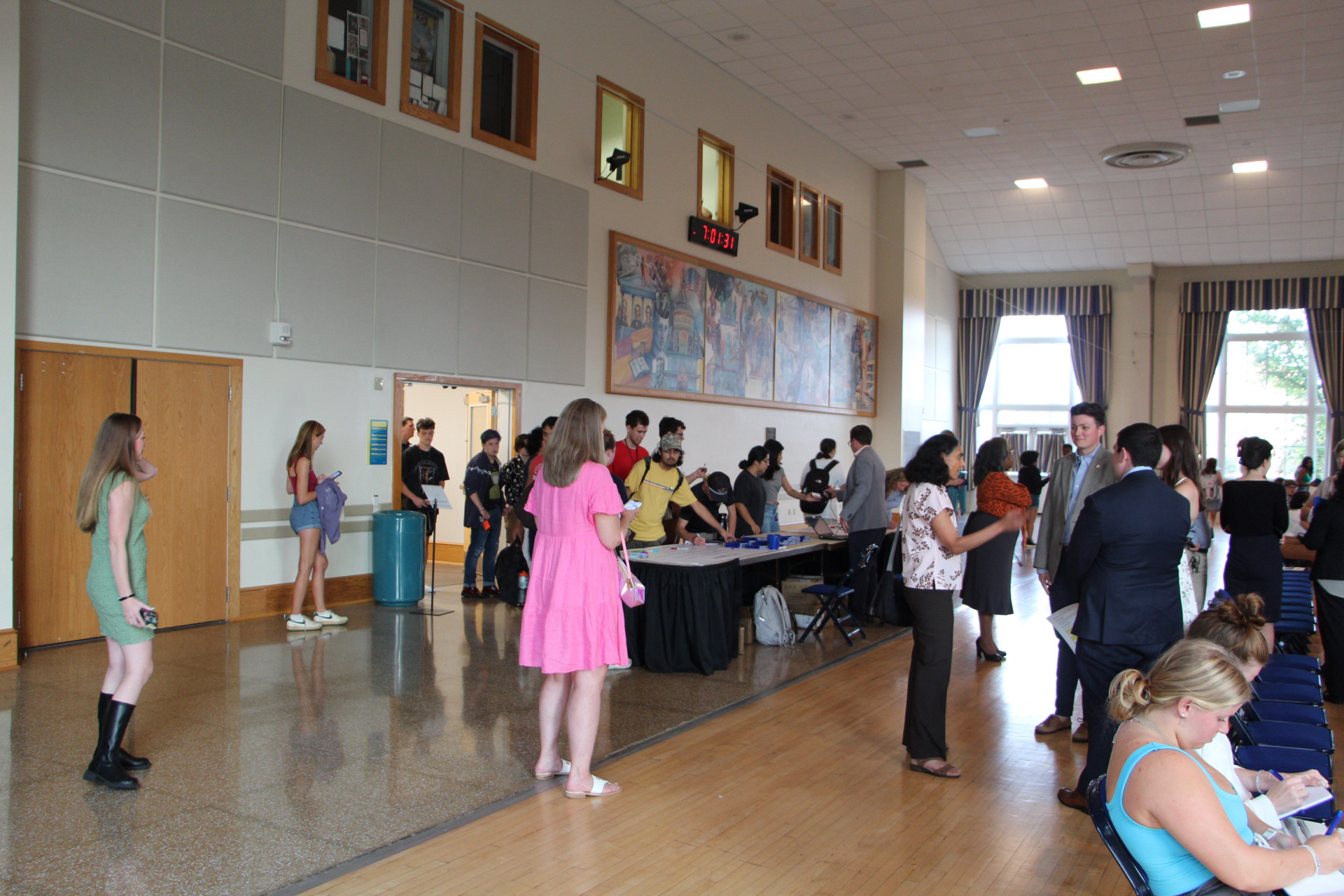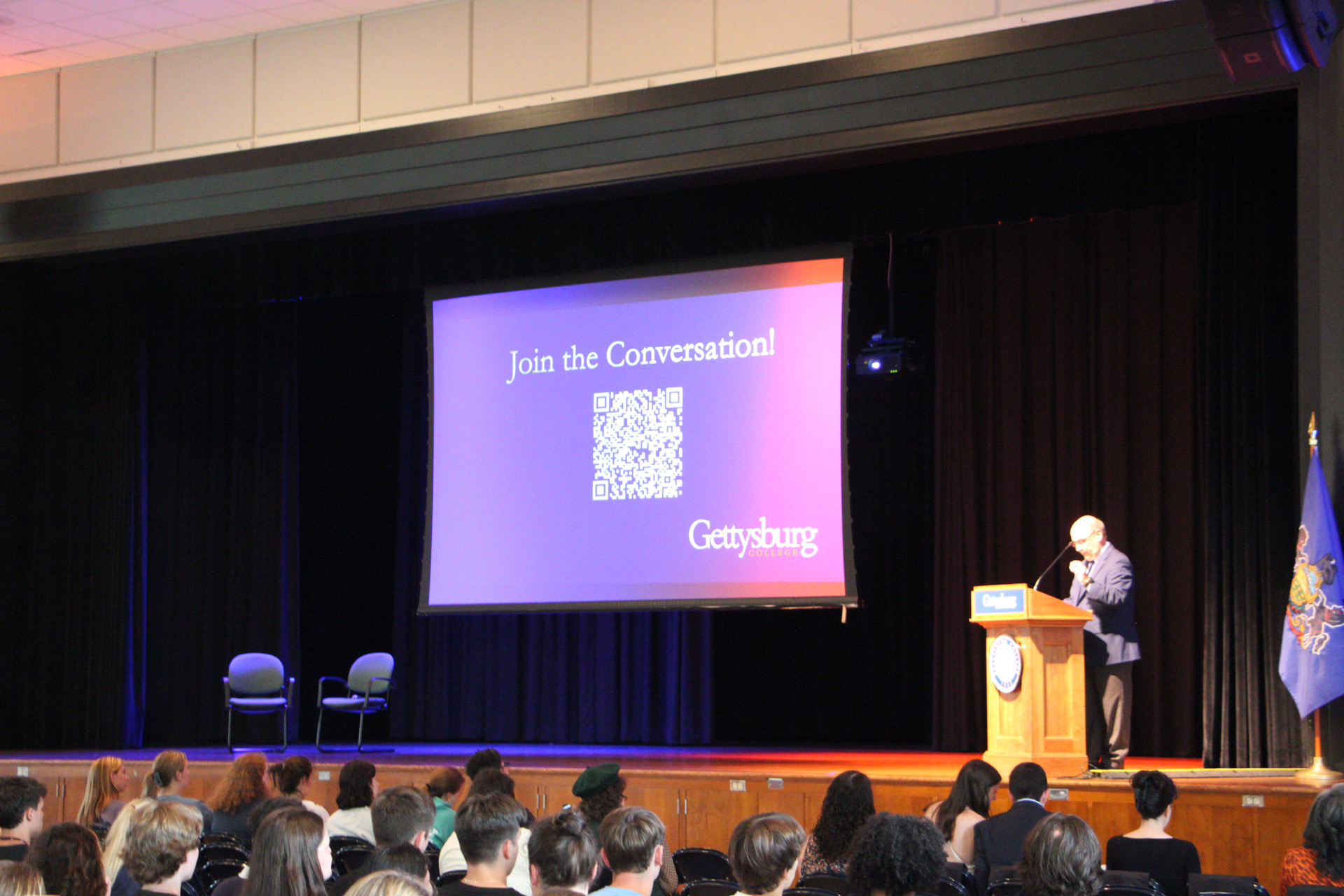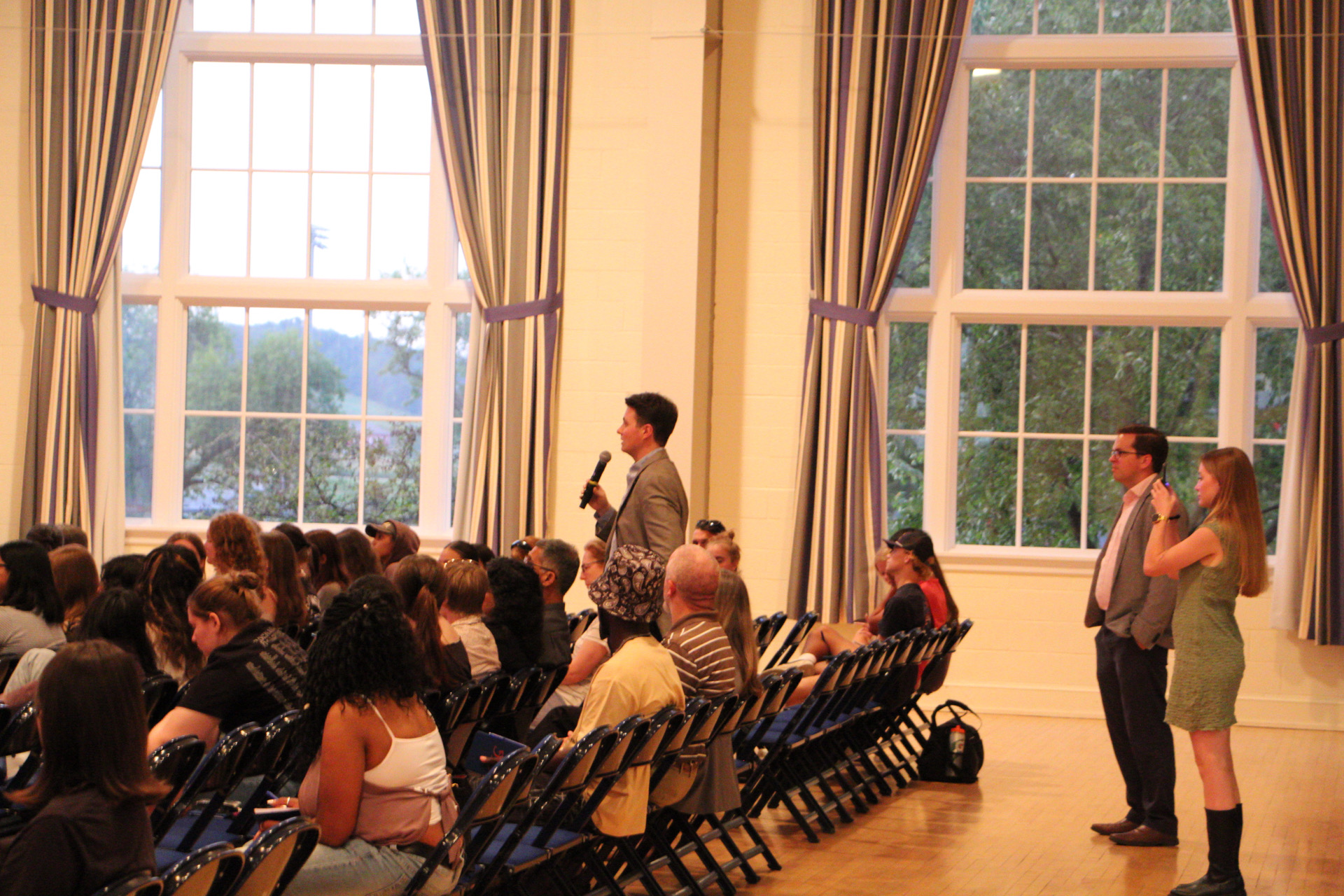College Launches ‘Conversations for Change’ Initiative with Ballroom Lecture

Students listen to Rajiv Vinnakota speak during the College’s first major Conversations for Change event. (Vincent DiFonzo/The Gettysburgian)
By Vincent DiFonzo, Editor-in-Chief
Rajiv Vinnakota, president of the Institute for Citizens and Scholars, spoke on the first day of classes in the College Union Building Ballroom, the first major event part of the College’s new “Conversations for Change” initiative launched this semester.
Conversations for Change, stylized as C4C, seeks to decrease political polarization and create constructive dialogue among Gettysburg students and faculty.
“Story after story demonstrates how political polarization on college campuses has made constructive conversation across differences more challenging than ever,” reads the College’s C4C webpage. “But college campuses are precisely where those conversations are most needed.”
College President Bob Iuliano, along with more than 90 other college presidents, partnered with the Institute for Citizens and Scholars and signed onto their College Presidents for Civic Preparedness initiative. This “gives Gettysburg access to faculty development workshops, national conversations and other resources focused on advancing critical dialogue on our campuses and beyond,” according to the C4C webpage.
The speech, entitled “Living in Our Community: Conversations for Change,” began at 7 p.m. on Monday. The first 450 attendees were offered free notebooks with the C4C logo.
Upon entering the ballroom, students were encouraged to sign the C4C pledge, which challenges signatories to “engage in dialogue across difference,” “educate myself,” and “support one another.”

Students entering the ballroom for Raj Vinnakota’s Conversations for Change lecture and Q&A. (Vincent DiFonzo/The Gettysburgian)

President Bob Iuliano introduces Rajiv Vinnakota. (Vincent DiFonzo/The Gettysburgian)
Iuliano opened the lecture, speaking on the goals of C4C.
“We are committed to developing leaders here who will lead and be socially responsible citizens and tackle the many challenges in our communities ahead of us. It’s at the heart of our mission, it means doing everything we can in these polarized times to strengthen our democracy, to enhance our willingness to communicate across differences.”
Iuliano introduced Vinnakota, whose speech focused on why an initiative such as C4C is important and how having the skills to engage with those with opposing viewpoints has societal, personal and professional benefits.
“This initiative is really about a special skill that will be super helpful in all parts of your life — college, your future job and beyond. And by the end of tonight, I want you to be excited to use this skill,” said Vinnakota.
He then shared examples of when he believes civil discourse has succeeded.
“We actually see outcomes of productive civil discourse all around us, if people are paying attention. Because countless local town hall meetings, school board referendums, state budgets are products of significant engagement of people with very different views engaging in debates, compromise which eventually lead to community decisions. It’s happening everywhere,” said Vinnakota. “And it can happen across political and ideological grounds because there’s often overlap to be found.”
He also cited two recently passed laws, the First Step Act of 2018 and Infrastructure Investment and Jobs Act of 2021, as examples of bipartisan compromise.
Vinnakota next cited historical examples of “the values of civil discourse, from the highest level for a nation, to talking about policy, to individual interactions.”
“I’m gonna start with Nelson Mandela. Who here’s heard of him?” Vinnakota joked, introducing the story of the Nobel Peace Prize-winning former South African president and anti-apartheid activist.
Mandela spent his life fighting against apartheid — laws that heavily segregated South African society and pushed the majority-black population into poverty, while lifting up the white minority. For his efforts, Mandela spent 27 years in prison before the end of apartheid in 1991. In 1994, he was elected president of the country.
“In 1996, he started the Truth and Reconciliation Commission to help people have respectful conversations about past injustices. Both victims of gross human rights violations and perpetrators of violence gave testimony,” said Vinnakota. “Mandela’s approach to civil discourse helped heal a nation as it moved from a white government to a multi-racial government.”
Vinnakota also introduced Daryl Davis, an African-American musician and activist responsible for deradicalizing over 200 members of the Klu Klux Klan, one of the nation’s most infamous hate groups.
“Instead of confronting them [KKK members] with hostility, Davis approached them with curiosity and an open mind. Think about that — a black man spending time with members of the KKK,” said Vinnakota. “Once people feel that they are being listened to, he says, it’s easier to plant a seed of doubt.”
Vinnakota then shifted to talking about how students can engage in civil discourse. He recommended three steps during conversation: “pause and paraphrase,” “ask curious questions,” and “share your view,” said Vinnakota. “Remember, the goal is to build a shared understanding, not to win or immediately change someone’s mind.”
Next, two students joined Vinnakota to moderate the lecture’s Q&A session: C4C student coordinator Olivia Taylor ’25 and Student Senate President Michael Woods ’25.
First, Taylor questioned if college campuses are in a debate between freedom of expression and creating safe spaces, and how to address these issues in Gettysburg.
Vinnakota argued that free inquiry is essential to higher education, but differentiated the term from free expression.
“Free expression is what’s covered under the First Amendment. You can say almost anything you want,” said Vinnakota. “But a university or a college asks you to do more, and that’s where the term free inquiry comes in, because it’s about being thoughtful in asking the critical questions that I’ve been talking about in my speech.”

Carl DeMarco ’25 asks a question during the Q&A. (Vincent DiFonzo/The Gettysburgian)
The Q&A turned to the audience for additional questions. One student asked whether or not hate speech can be eliminated.
“I think that just stopping it, we’ll actually not be able to get people to learn that their speech is hateful,” said Vinnakota. “If they are told not to speak, how are they going to learn?”
Another student asked about freedom of expression versus safe spaces, arguing that safe spaces should “be safe enough for freedom of expression.” She asked how to engage in civil discourse while feeling safe. Vinnakota said that this addresses the core of civil discourse, and that schools across the country are working to establish norms that protect free expression and safety.
“Creating the tools to do that [civil discourse], that’s what the practice is. That’s why it takes so long,” he said.
Vinnakota’s speech is the first of many C4C events planned this year. These events include lectures, panel discussions, workshops, the campus policy debate and voter registration drives. Additionally, C4C events can be hosted by student organizations, which will be able to apply for mini-grants to host relevant activities.
The College has invited two additional C4C speakers this semester. On Sept. 17, journalist and author Colin Woodward will speak on the vulnerabilities of democracy, and on Nov. 15, Roger Worthington of the Difficult Dialogues Resource Center will speak on creating spaces for effective dialogue.
